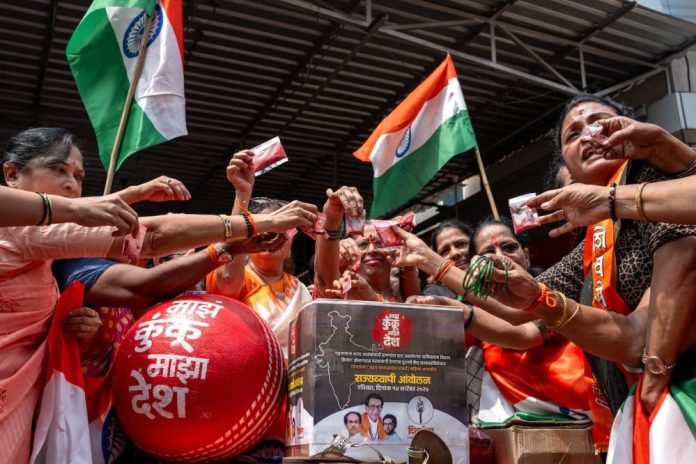Welcome to Foreign Policy’s South Asia Brief.
The highlights this week: The Indian national cricket team snubs Pakistan on the pitch, Nepal swears in interim leader Sushila Karki after mass protests forced the prime minister to resign, and U.S. hostage envoy Adam Boehler returns to Kabul.
Handshake Snub Reflects Tense Moment
The Indian and Pakistani national cricket squads faced off in an Asia Cup match in Dubai on Sunday. The result wasn’t a surprise: India, one of the sport’s powerhouses, easily defeated Pakistan. But afterward, India’s team did not shake hands with the Pakistani cricketers and walked off the pitch. In response, the Pakistani team refused to participate in a post-match press conference.
India’s captain, Suryakumar Yadav, said after the match that the pre-planned gesture was intended to signal solidarity with the victims of the April terrorist attack in Pahalgam, Indian-administered Kashmir, which killed 26 civilians. India blamed the attack on Pakistan and prompted a brief military conflict between the two countries. Pakistan has repeatedly denied involvement in the Pahalgam attack.
The handshake snub reflects uncharted territory for India-Pakistan relations. Even during tense moments, people-to-people ties have flourished; the two countries have ramped up trade right after military conflicts. A citizen-led peace initiative sponsored by media groups in both countries was launched barely a year after the 2008 Mumbai attacks, carried out by the Pakistan-based Lashkar-e-Taiba.
Cricket diplomacy has long been a part of this story—a trend that observers date to 1987, when Pakistani military dictator Zia-ul-Haq traveled to India to watch an India-Pakistan test match at a moment of heightened tensions over disputed Kashmir. The two teams have faced off a few times in recent years, always with camaraderie and good sportsmanship.
The vibe of Sunday’s match seemed different even before play began. Some Indian politicians and former cricketers called on their squad not to participate in matches with Pakistan in the Asia Cup—a position likely influenced by boycott calls from Pahalgam victims’ families. Protests broke out ahead of the match, and a few Indian law students even filed a petition saying that it went against the national interest. (The Supreme Court ruled against it.)
Tellingly, the handshake snub was not roundly condemned back home: The Indian government was silent, and many people applauded the move. A senior Indian cricket official said that people should focus on India’s victory, not the controversy.
But this blow to cricket diplomacy of course signals an especially tense moment in the India-Pakistan relationship. The May conflict was the most intense between the two countries in decades. After the Pahalgam attack, India also took nonmilitary steps that directly undercut people-to-people ties, including shutting the borders and suspending all trade.
Ultimately, this episode does not bode well for the long-term trajectory of bilateral ties. People-to-people exchange can build trust and help stabilize the broader relationship. Today, with India-Pakistan relations on ice and no off-ramp in sight, the shrinking of space for cooperation outside of government channels will make it all the more difficult to get things back on track.
What We’re Following
Nepal swears in interim leader. Sushila Karki, a 73-year-old former Supreme Court chief justice, was appointed Nepal’s interim prime minister last Friday. The move came just days after mass unrest over corruption—in which 72 people were killed—prompted the resignation of Prime Minister K.P. Sharma Oli.
Karki was endorsed by many of the young activists who led last week’s protests. She will lead the government for six months, with elections scheduled for March. Along with other new ministers sworn in on Sunday, Karki has a reputation as a strong anti-corruption advocate who has vowed to pursue the demands for improved governance.
Nepal’s response to the mass protests so far is similar to that of Bangladesh last year, with an ousted leader quickly replaced by a figure that commands respect, especially among young people. But what sets Nepal apart is that the interim government quickly set a date for elections, which could be a good sign for stability. (In contrast, Bangladesh’s interim leaders declined to provide a time frame for a formal transition until recently.)
Nonetheless, Nepal’s interim government will still face similar challenges—particularly in managing the public’s high expectations for ambitious, far-reaching reforms that will take a long time to implement.
U.S. hostage envoy visits Kabul. U.S. hostage envoy Adam Boehler and former U.S. Ambassador to Afghanistan Zalmay Khalilzad met with Afghan Foreign Minister Amir Khan Muttaqi in Kabul last Saturday. A Taliban government statement said that the two sides reached an agreement on the release of prisoners but did not provide specifics. Several U.S. hostages remain in the country.
Four U.S. hostages have been released this year: two during the final hours of President Joe Biden’s administration in January (Ryan Corbett and William McKenty), and two in March after a visit by Boehler and Khalilzad (George Glezmann and Faye Hall). The Taliban regime has advocated for the release of Muhammad Rahim, the last Afghan national held in Guantanamo Bay.
There was no formal U.S. statement about the latest visit. Secretary of State Marco Rubio told reporters over the weekend that Boehler was in Kabul “to explore what’s possible,” suggesting the discussions were not focused on any specific prisoner release.
Both sides have strong incentives to see talks through: The Trump administration’s core policy objective in Afghanistan is to secure the release of captive U.S. citizens, while the Taliban government is keen to gain more legitimacy from the United States in its efforts to normalize ties.
South Asian leaders at Doha summit. Pakistani Prime Minister Shehbaz Sharif, Maldives President Mohamed Muizzu, and Bangladeshi foreign advisor Touhid Hossain all attended a special Arab-Islamic summit in Doha on Monday that expressed solidarity with Qatar after Israeli airstrikes against Hamas leaders in its territory last week.
Though there may not be much that unites South Asia’s Muslim-majority states, they often come together to condemn Israeli actions.
Pakistan may need to tread more carefully than the others, though: It is aggressively courting the Trump administration with commercial opportunities linked to critical minerals, energy, and cryptocurrency as it looks to strengthen ties more broadly. This outreach could be affected if Pakistan’s criticism of Israel is poorly received in Washington.
Pakistan has not held back from harshly criticizing Israel’s war in Gaza and its recent conflict with Iran, during which the United States carried out strikes on Iranian nuclear facilities. The Israel-Qatar crisis may have come up in a call between Rubio and his Pakistani counterpart, Ishaq Dar, last Sunday.
Under the Radar
Nearly 460 people, mostly soldiers, have been killed so far this year in attacks in Pakistan’s two western provinces, and there are indications that Tehreek-e-Taliban Pakistan (TTP) is deepening its presence and influence in the region.
Pakistan has struggled to curb a rise in terrorist attacks in its west, near the border with Afghanistan, since the Taliban returned to power in Kabul more than four years ago. Most of the attacks have been carried out by the TTP from bases in Afghanistan; the Taliban regime has done little to address them.
Pakistan has previously pursued a range of actions, including building a border fence, holding talks with the TTP, and launching airstrikes in Afghanistan. But as attacks continue, recent days suggest that Pakistan is considering a major ramp-up of efforts to rein in TTP militancy.
Last week, the Pakistani military launched three separate operations on TTP camps near the border with Afghanistan. Nineteen Pakistani soldiers and 45 militants were killed during these raids, according to military estimates.
Pakistani airstrikes on Sunday reportedly targeted a school and guest house in Khyber Pakhtunkhwa province where TTP members were thought to be present. Though Pakistan is clearly looking to expunge the growing TTP presence within its borders, the group is still based in Afghanistan, and that means militants will continue to cross the border.
This suggests Pakistan might contemplate operations in Afghanistan—perhaps even going further than the limited airstrikes that it has previously carried out there. According to Pakistani reports, Pakistan’s special representative to Afghanistan was scheduled to visit Kabul this week to deliver a “stern message” to the Taliban about its “facilitation” of the TTP.
Islamabad will talk tough. However, hitting Afghanistan hard could further inflame tensions between Pakistan and the Taliban regime in Kabul, while scorched-earth operations within its own borders risk alienating communities and delivering a propaganda victory to the TTP.
FP’s Most Read This Week
Regional Voices
In the Daily Star, engineering professor Md. Shafiqul Islam lays out what must be done before Bangladesh’s Rooppur nuclear power plant is operationalized next year, and the rewards that the plant can bring. “Rooppur is not just another mega-project,” he writes. “It represents a commitment to fostering a culture of safety, security, transparency and long-term responsibility in the peaceful use of nuclear technology.”
In Pakistan Today, analyst Suleman Zia argues that the struggles of Pakistani cricket extend beyond failures on the pitch. “They are products of deeper neglect in planning, management, and development,” he writes. “The real question is not whether Pakistan can win a match but whether it can build a system that produces excellence consistently over decades.”
A Kathmandu Post editorial asserts that Karki, Nepal’s interim prime minister, must maintain a singular focus on preparing for elections in March. “Of course, as the head of government, she will have to deal with multiple issues from Day One. But if timely elections are the government’s focus, many other issues will take care of themselves,” the editorial argues.

